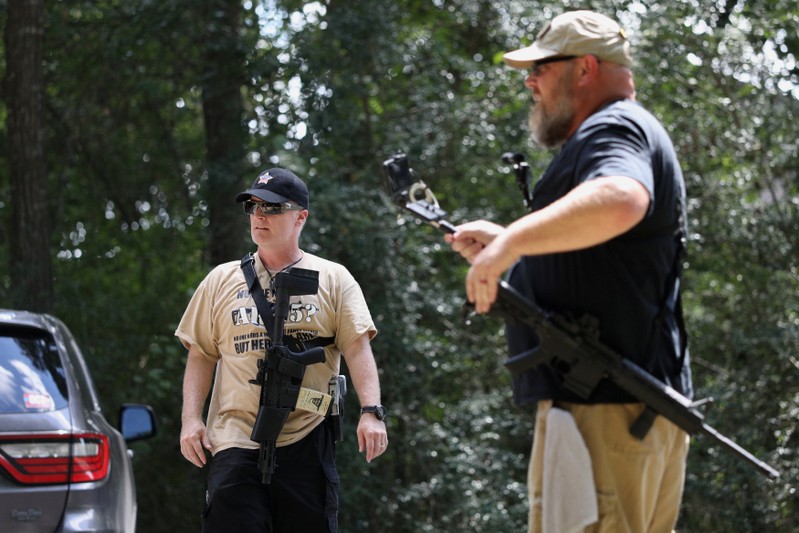
C.J. Grisham (L), founder of Open Carry Texas, and Greg Holland, a member of Open Carry Texas, openly carry firearms in Houston, Texas, U.S., September 24, 2018. Picture taken September 24, 2018. REUTERS/Loren Elliott
October 8, 2018
By Daniel Trotta
(Reuters) – When Missouri Senate Bill 656 was introduced in 2016, it was relatively modest legislation that proposed capping the amount county sheriffs could charge for a concealed handgun permit.
By the time it passed, with both houses of the state legislature overturning the governor’s veto, it had become one of the most expansive gun-rights laws in the country.
The gun lobby fought hard to pass the bill. The group some lawmakers credited with providing crucial momentum was not so much the National Rifle Association, the powerful national lobbying organization, but rather the Missouri Firearms Coalition, an aggressive grassroots operation founded in 2015.
With major gun-rights legislation stalled in Washington, much of the action has shifted to the states, where self-described “no compromise” groups such as the Missouri Firearms Coalition have mobilized activists in favor of pro-gun laws, according to Reuters interviews with gun-rights groups in more than a dozen states, lawmakers and NRA supporters.
These groups have become increasingly active in promoting a pro-gun agenda in many states, unafraid of alienating lawmakers who waver on gun rights. In many cases, they say they would rather lose a legislative fight on principle than compromise and support a watered-down bill.
At times, this can put local groups at odds with the NRA, which some see as too willing to give ground on the most aggressive pro-gun laws in state legislatures, said Greg Pruett, president of the Idaho Second Amendment Alliance, which formed in 2012.
“It’s always kind of interesting when you see a lot of people in the gun control community talk about how radical the NRA is,” said Pruett, whose group organized an email and telephone campaign to pass a 2016 Idaho law allowing people to carry concealed handguns without a permit, also known as “constitutional carry.”
“There’s an entire movement on the other side of the NRA … We’re done compromising,” he said.
Missouri Firearms Coalition political advisor Aaron Dorr says the NRA fought against constitutional carry for years, considering it too much of a longshot, and only came on board once passage was certain. The Missouri law not only authorized constitutional carry, it made Missouri a “stand your ground” state, extending the right to lethal self-defense outside the home, even when retreating is an option.
“It was the Missouri Firearms Coalition that was on the ground first with this,” said Jered Taylor, a Missouri state representative. “Eventually the NRA came on board, but the Missouri Firearms Coalition was the one that pushed it.”The NRA contended that it supported Senate Bill 656 from start to finish. The NRA assesses legislation across the states and sometimes opts for incremental victories, spokesman Lars Dalseide said.
“While the all or nothing approach may sound noble, the fact is you usually end up with nothing,” Dalseide said. “The other groups may have called for the passage of these bills in the past but they are largely fundraising organizations … None of these legislative initiatives moved an inch until the NRA got involved.”
STATE GROUPS PROLIFERATE
State-level alternatives to the NRA have proliferated this decade and are active in at least 15 states. Many groups claim tens of thousands of members, citing their own emails lists or social media data. Reuters could not verify the membership and no independent data exists that shows the size of the groups.
CJ Grisham, who founded Open Carry Texas in 2013, said organizations like his were established to fill a void left by the NRA. “I would not have formed Open Carry Texas if the NRA was doing its job,” he said.
The most uncompromising among them say the NRA has become too timid and too willing to back measures such as removing firearms from people deemed dangerous.
“I call it pre-emptive concession,” said Paul Valone, president of Grass Roots North Carolina, which has helped expand concealed carry rights and a “stand your ground” law.
Still, even its critics in the gun-rights movement concede the NRA, with more than 5 million members, is by far the most powerful and well-connected gun lobby. It has protected firearms manufacturers from liability for gun violence and pushed a ban on U.S. health officials from promoting gun control. In 2005 it shepherded through Florida’s landmark “stand your ground” law, then repeated the feat in nearly half the states.
With a national network of lobbyists, the NRA works closely with legislators behind the scenes, while the state groups often rely on members to pressure representatives.
From 2015 to 2017, seven states passed constitutional carry laws, including Idaho, Maine, New Hampshire, West Virginia and Missouri, where local groups not affiliated with the NRA claim significant roles in getting the legislation passed. It is now the law in a dozen states.
In the capital of Jefferson City, former Missouri State Representative Eric Burlison had been interested in making Missouri a constitutional carry state since 2014.
The NRA, while supportive, was unconvinced the legislation could pass and wanted to “focus on other issues,” Burlison said.
When Senate Bill 656 arrived in the House in 2016, Burlison decided it was time to press for a much bolder law, adding both constitutional carry and “stand your ground” provisions.
Though he credited the NRA for eventually supporting the legislation, he said the Missouri Firearms Coalition actively corralled support.
“It really added octane to the tank when other groups started forming and other people got involved,” Burlison said. “The biggest group clearly was Missouri Firearms Coalition. To me, all politics is local. More legislators pay attention to their local organizations and individuals.”
(Reporting by Daniel Trotta, Editing by Dina Kyriakidou and Paul Thomasch)

